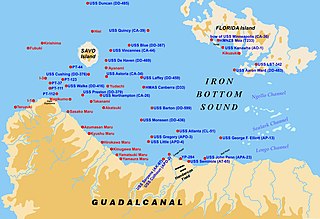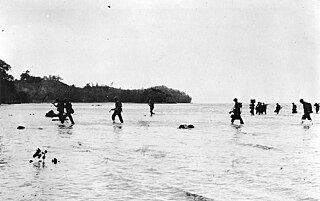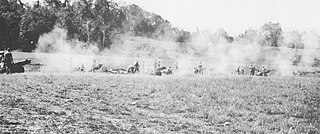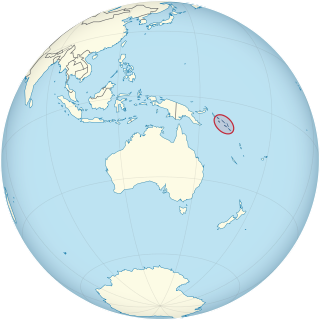
The Guadalcanal campaign, also known as the Battle of Guadalcanal and codenamed Operation Watchtower by American forces, was a military campaign fought between 7 August 1942 and 9 February 1943 on and around the island of Guadalcanal in the Pacific theater of World War II. It was the first major land offensive by Allied forces against the Empire of Japan.

Guadalcanal is the principal island in Guadalcanal Province of the Solomon Islands, located in the southwestern Pacific Ocean, northeast of Australia. It is the largest island in the Solomons by area and the second-largest by population. The island is mainly covered in dense tropical rainforest and has a mountainous hinterland.

USS Little (DD-79/APD-4), a Wickes-class destroyer in the United States Navy during World War I and World War II. She was the first Navy ship named for George Little (1754–1809).

Purvis Bay is located in the Nggela Islands, part of the Solomon Islands. Purvis Bay is the sheltered area to the south of the island Nggela Sule, including and trending southeast from the neighbouring Tulagi islet.

USS Serpens (AK-97) was a Crater-class cargo ship commissioned by the United States Navy for service in World War II. She was the first ship of the US Navy to have this name: she is named after Serpens, a constellation in the northern hemisphere. Serpens was crewed by United States Coast Guard personnel and was responsible for delivering troops, goods and equipment to locations in the Asiatic-Pacific Theater.

Guadalcanal Province is one of the nine provinces of Solomon Islands, consisting of the island of Guadalcanal. It is a 2,510 square mile (5,336 km2) island and is largely a jungle. Its name was given by Pedro de Ortega Valencia, born in the village of Guadalcanal, Seville, Spain. The national capital and largest city of the Solomon Islands, Honiara, is on the island; in July 1983, it was designated a 22 km2 (8.5 sq mi) separately-administered Capital Territory and is no longer considered part of the province. The population of the province is 93,613 (2009), not including the capital territory. The population of the island is 161,197. Honiara serves as the provincial capital. The climate is rainforest tropical. The estimated terrain elevation above sea level is 447 meters (1,467 ft).

Lunga Point is a promontory on the northern coast of Guadalcanal, the site of a naval battle during World War II. It was also the name of a nearby airfield, later named Henderson Field. USS Lunga Point is also the name of a United States Navy escort carrier that operated in World War II.

Indispensable Strait is a waterway in the Solomon Islands, running about 200 kilometres northwest-southeast from Santa Isabel to Makira, between the Florida Islands and Guadalcanal to the southwest, and Malaita to the northeast.

The Battle of the Tenaru, sometimes called the Battle of the Ilu River or the Battle of Alligator Creek, was a land battle between the Imperial Japanese Army and Allied ground forces that took place on 21 August 1942, on the island of Guadalcanal during the Pacific campaign of World War II. The battle was the first major Japanese land offensive during the Guadalcanal campaign.

The Battle of Edson's Ridge, also known as the Battle of the Bloody Ridge, Battle of Raiders Ridge, and Battle of the Ridge, was a land battle of the Pacific campaign of World War II between Imperial Japanese Army and Allied ground forces. It took place from 12–14 September 1942, on Guadalcanal in the Solomon Islands, and was the second of three separate major Japanese ground offensives during the Guadalcanal campaign.

The Battle for Henderson Field, also known as the Battle of Guadalcanal or Battle of Lunga Point by the Japanese, took place from 23 to 26 October 1942 on and around Guadalcanal in the Solomon Islands. The battle was a land, sea, and air battle of the Pacific campaign of World War II and was fought between the Imperial Japanese Army and Navy and Allied forces, mainly U.S. Marines and Army. The battle was the last of three major land offensives conducted by the Japanese during the Guadalcanal campaign.

The Battle of Tulagi and Gavutu–Tanambogo was a land battle of the Pacific campaign of World War II, between the forces of the Imperial Japanese Navy and Allied ground forces. It took place 7–9 August 1942 on the Solomon Islands, during the initial Allied landings in the Guadalcanal campaign.

Carlson's patrol, also known as The Long Patrol or Carlson's long patrol, was an operation by the 2nd Marine Raider Battalion under the command of Evans Carlson during the Guadalcanal campaign against the Imperial Japanese Army from 6 November to 4 December 1942. In the operation, the 2nd Raiders attacked forces under the command of Toshinari Shōji, which were escaping from an attempted encirclement in the Koli Point area on Guadalcanal and attempting to rejoin other Japanese army units on the opposite side of the U.S. Lunga perimeter.

The Koli Point action, during 3–12 November 1942, was an engagement between U.S. Marine Corps and U.S. Army forces and Imperial Japanese Army forces around Koli Point on Guadalcanal during the Guadalcanal campaign. The U.S. forces were under the overall command of Major General Alexander Vandegrift, while the Japanese forces were under the overall command of Lieutenant General Harukichi Hyakutake.
Marau Sound is a sound in the Solomon Islands; it is located at the eastern end of Guadalcanal Island, in Guadalcanal Province.
Tavanipupu is an island in the Solomon Islands. It is located in Marau Sound, at the eastern end of Guadalcanal, between Towara'o Island and Marapa Island, and is part of Guadalcanal Province.

Honiara is the capital and largest city of Solomon Islands, situated on the northwestern coast of Guadalcanal. As of 2021, it had a population of 92,344 people. The city is served by Honiara International Airport and the seaport of Point Cruz, and lies along the Kukum Highway.
The Diocese of Guadalcanal is one of the nine current dioceses of the Anglican Church of Melanesia. It was founded on 23 June 2013.

US Naval Base Solomons was a number of United States Navy bases in the Solomon Islands in the Pacific Ocean. Most were built by the US Navy Seabees, Naval Construction Battalions, during World War II as part of the Pacific War. In August 1942 the United States Armed Forces took the Guadalcanal in the Solomon, in the Battle of Guadalcanal. US Navy Seabees built a new base at Guadalcanal, Naval Base Guadalcanal and then on other islands in the Solomons.















